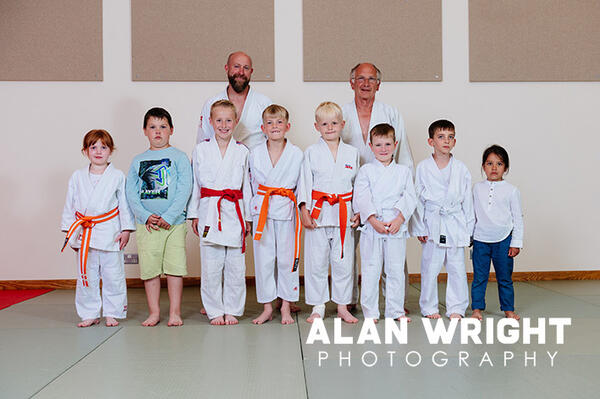Horsham Judo Club

Published: 1st August 2022
Derek Paxton has devoted his life to judo as a coach, competitor and referee. A work accident left him unable to reach the highest levels of the sport, but he has coached hundreds of people of all ages since establishing Horsham Judo Club in 1976. Here, Derek tells his story…
PROMISING START
I first went to a judo class when I was nine. My dad, Len, coached at Crawley Judo Club, which met in the huts at Tilgate Forest. In terms of martial arts, there wasn’t much choice for young people at that time and even judo was assumed by many to be dangerous. It wasn’t until Tokyo 1964 that it was seen at the Olympics, initially only as a demonstration sport.In 1963, I entered my first competition and steadily improved, winning my first county medal when I was 12. In 1966, I won gold at the Sussex Championships, silver in the regionals and bronze at the nationals. That led to my selection for the U21 Olympic Squad, the feeder group for the Senior squad. I was awarded my black belt 1st Dan aged 21 and had hopes of reaching the top, but that ended with my accident.
I worked for a company that manufactured stainless steel tanks. My glove snagged as I fed a steel sheet into a cylinder and I lost two and a half fingers when my hand was dragged into the machine. After that, I couldn’t compete nationally, but I didn’t want to quit judo. I just focused on coaching instead and founded a club in Horsham.
ROFFEY MOVE
Initially, we were called Horsham Park Judo Club and met at The Park Recreation Centre (now The Rec). My dad coached the U8s and I led junior and senior classes. Initially, The Rec had one large hall, which was perfect, but when they added the mezzanine floor and created the bowling alley, we had to find a new home.
We spent almost a decade at Horsham Youth Club on Hurst Road before moving to Southwater Leisure Centre. Before COVID, the Parish Council decided to close the gym and under new management the hiring fees were more than we can afford. So, we moved to Roffey Millennium Hall and are now attracting new youngsters from the surrounding areas. The fact that the hall served as a Vaccination Centre is a reminder of the difficult times all clubs and organisations have been through during the past two years.
Because of the physicality involved, it was some time before judo clubs could restart and a few juniors decided not to re-join. Since moving to Roffey, it is the U-8 section that has boomed and we often have a dozen youngsters in the class. Some will soon be ready to move up and re-energise the junior section. The seniors section is in good health too and we’ve seen some new faces. We’re very inclusive and proud to have members with Cerebral Palsy and Visual Impairment at the club.
WHO’D BE A REF?
As well as being a coach, my dad was a referee. He would officiate at competitions where I was taking part and was always harder on me than anyone else. He made me work that bit harder! Following in his footsteps, I qualified as a referee while also gaining my coaching credentials. My dad reached a national level as a referee and I went one better, reaching a European B standard and officiating the final of the 1990 European Team Championships. I also served on the Sussex Committee for 25 years from 1976, holding many positions until finally retiring as Chairman.
CLUB SUCCESS
There are 22 judo associations in this country alone and the British Judo Association (BJA) is the largest and the one that’s recognised by the International Judo Federation. Only members from the BJA can represent Great Britain at the Olympics. We are proud members of the association. We follow the BJA grading system, from white belt to brown, with grades based on technique and understanding. After gaining a brown belt, an individual can choose either competitive or non-competitive routes to become a black belt 1st Dan.
You can compete against others (opponents are evenly matched) and earn points based on results. Victory by ippon gets you ten points and 100 points earns you the belt, if you also pass a theory test. Then you can work towards the next Dan grade. There’s also a technical route to earn a black belt, which requires knowledge and understanding of the history of judo as well as technique. I am a black belt 5th Dan and many other black belts have come through the club, with several competing at a national level.
YOUTH OF TODAY
During the club’s heyday, we had 30 children at each session. However, young people today have more choice when it comes to sports and hobbies, and that’s if you can get them off the computer! Other forms of martial arts have grown in popularity too, so we don’t attract the numbers we once did. However, judo remains a great sport for confidence. You learn to control yourself and that gives you confidence on the mat and in other aspects of life. There’s a learning curve that goes beyond just technique.
I’m 68 now and like the idea of eventually passing the club on to someone. However, I’m happy to keep going for now. During COVID, I had problems with my knees and shoulders because I wasn't exercising as regularly. But I never considered stopping, as I've put in too many years to give it all up that easily.
Further information: Horsham Judo Club meets on Tuesdays:Under 8s: 5.30 – 6.30pmJuniors (8 – 14): 6.30 - 7.30pm Seniors: (14+): 7.30 – 8.30pm
visit: www.horshamjudoclub.com
WORDS: BEN MORRIS
PHOTOS: ALAN WRIGHT






